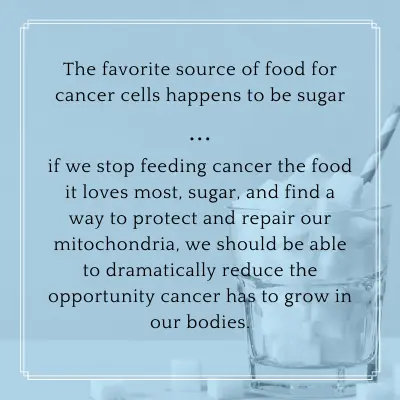I don’t know of a single person who isn’t at least a little terrified that one day they’ll get the news that either they or one of their loved ones has developed cancer. It seems that with every passing day, the number of people who’s lives hasn’t been touched by cancer shrinks.
There are many different types of cancer, and even more risk factors and possible prognoses. Depending on the type of cancer and how early it was detected, it may be treatable. Doctors rarely, if ever, use the word “curable”.
I, myself, am not a doctor. But I am less afraid of cancer than many of my friends, family, and acquaintances because I believe that it is largely preventable and, through fasting, I can dramatically reduce my risk of ever developing this terrifying disease. In this article, I will share with you why I believe so, and how you can begin reducing your risk as well.
Can Fasting Prevent Cancer
Medical science is progressing incredibly fast, but to date, we don’t have a single definitive cause of cancer, and to state that it’s completely preventable would be incredibly misleading and entirely false. However, from what we do know about the development of cancer and tumor growth, we can reduce our risk factors considerably.
Cancer begins in a single cell or small group of cells. At any given time, you may have cancerous cells in your body that never grow to the point of damaging or threatening your health. As with all of our cells, they need to feed in order to survive and grow and cancer cells are remarkably hearty, unfortunately. As long as they have some nutrition, they can survive even without oxygen.
The Great Sugar Debate
The favorite source of food for cancer cells happens to be sugar. This is the subject of Nobel Prize-winning medical research that began in the 1920s – now 100 years ago. How our bodies metabolize sugar is actually one of the ways we’re able to detect cancer. When you go in for a PET scan after ingesting radioactive glucose, any areas where a significant concentration of glucose is found is a sign that there are cancerous cells greedily consuming the sugar.
Research has also shown us that cancer cells tend to thrive in areas where our cell mitochondria have been damaged. The mitochondrion is the part of a cell that converts glucose into energy that our body can use. If the mitochondria are damaged, the process of creating energy for use as fuel is severely compromised, but the ability to divide and replicate a cell is increased, giving cancer the perfect opportunity to grow.
What does all this mean? It suggests that if we stop feeding cancer the food it loves most, sugar, and find a way to protect and repair our mitochondria, we should be able to dramatically reduce the opportunity cancer has to grow in our bodies.
Fasting, alongside a healthy and nutrition-packed regular diet, is a way to do both.

Fasting for Cell Renewal
Many critics of fasting talk about the dangers of starvation. If you stop eating for a period of time, your body will not shut down and you will not immediately die. In fact, we’re biologically designed to become more efficient in times when we don’t have easy access to food.
When we follow a consistent feeding schedule, our body learns to expect regular fresh supplies of energy. Many people consistently graze 15 hours a day, giving their metabolism a constant supply of easy energy and no need to work for it.
When you suddenly stop providing your body with easy access to energy, your body will first start sending you hunger cues. But if you still don’t feed it, your biological system will assume that you don’t have access to food. If that’s the case, in order to survive it needs to provide your brain and muscles with more energy so you can go out and find food.
But if you’re not giving your body any energy, where will this burst come from? From stored energy. From your fat cells. And if you fast for long enough, your body has another backup system known as autophagy.
Autophagy is essentially the recycling team inside your body. If you don’t have any energy coming in, certain processes are triggered to search for possible sources of energy that have been neglected or ignored, such as damaged cells, toxins, and even bacteria that are hanging out inside your body where you don’t want it.
Autophagy is only triggered when your body doesn’t have an easy source of energy, but it is incredibly powerful in cleaning up all the potentially cancer-causing debris that lurks inside you. Fasting is the most effective way to start this process.
Fasting for Cancer Prevention
Cancer is obviously an enormous topic to cover in a short article, and I’m making no claims whatsoever to cure or prevent a disease that has frustrated highly trained medical professionals for decades. But by doing extensive research, I’m confident that fasting and a healthy, consistent diet plan can help me reduce my risk of developing cancer.
- Cancer loves sugar, so reducing the amount of sugar you consume is a smart way to improve your defense against cancer cell growth
- Cancer cells thrive where cells are damaged, so protecting your cells and creating the opportunity for your body to repair or recycle damaged cells reduces the opportunity for cancer to grow
- Your body is designed to keep you alive under any circumstances and there are very effective biological processes that will jump into action if you simply make life a little less easy on your metabolism
If you have been diagnosed with cancer, there have been limited, promising studies about the benefits of fasting during treatment, but there are also studies that indicate cancer cells can hijack the autophagic process to their benefit, so it’s critical that you always follow the advice of a physician who is trained in this specific field.
Fasting has been proven to have many benefits for health, ranging far beyond cancer prevention. If you’re interested in learning more about how it can help improve your quality of life, you might be interested in our related article, Is Fasting Healthy.



